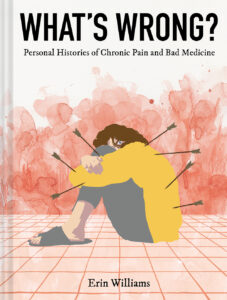 subtitled Personal Histories of Chronic Pain and Bad Medicine.
subtitled Personal Histories of Chronic Pain and Bad Medicine.
After a lifetime of anxiety and self-medication, Erin Williams realized that the American health system had failed her. At best, it focused on symptoms instead of attempting to treat her as an entire person, leaving her to suffer with chronic pain and, finally, to search for answers as to not only how to feel better physically but how to cope with the mental, emotional and spiritual despair that she was constantly told were merely aftereffects of her physical disease. If they were considered at all a source or contributor to her maladies, it was clearly because she was mistaken or, worse, making these symptoms up. If they couldn’t see the problem, the medical system insisted, then the problem couldn’t possibly be real.
One thing before I continue: while the back cover makes it very clear that this is an American healthcare issue, the contents do not. I understand why: the point of the author constantly saying “our” without specifying who “we” is makes the contents feel more immediately relevant to the reader. But anyone with experience of medicine in foreign countries — or at least the countries with decent medical systems like Malaysia, tho anywhere else feels truly exemplary compared to the hellscape that is American medicine with its demon master of for-profit health insurance — will feel immediately how alien and awful the treatment depicted here is. As someone who’s experienced both systems, I can attest to both the veracity of Ms Williams’ depiction, as well as the uniquely frustrating misery of being unable to access life-saving care because of paperwork and price-gouging when other countries somehow manage it just fine!
In her search for answers, Ms Williams discovered the power of community healing. She put out a call for other sufferers of chronic pain to share their stories, and compiled this book from their confessions. Through the stories of Dee, Rain, Alex and Adriana — along with her own extensive experiences not only as a patient but as a medical researcher — she narrates an extraordinary, sensitive exploration of the ways in which American medicine fails the patient, especially if that patient isn’t a cis white male.
Ms Williams hints that in this respect the medical system is merely an extension of American society, selfishly centering the most privileged to the detriment of all. Those on the margins must rely on folk medications or self-medication for relief from a pain some doctors refuse to believe exists, leading, ofc, to worse outcomes later on. But that’s the problem when an evidence-based system refuses to count testimony as evidence, and too often dismisses patient self-advocacy as drug-seeking. Compassion, too, is so often missing from mainstream healthcare that the ill become susceptible to any dubious claim offering relief (exacerbated by the underfunding of American education) so long as it’s given with seeming concern for the individual.
The book’s many illustrations underscore the somber message of the text. As someone without a genetic predisposition for addiction, I did have trouble relating to some of the passages Ms Williams highlights. But I did very much appreciate her recounting of raw emotions and experiences, as it expands my own understanding of the human condition. A relatively quick read, this book should be required reading for all healthcare professionals, so they can better understand where the current system is failing society and where we can all work together, making small changes to improve everyone’s quality of life.
What’s Wrong? by Erin Williams was published January 23 2024 by Abrams Comicarts and is available from all good booksellers, including
